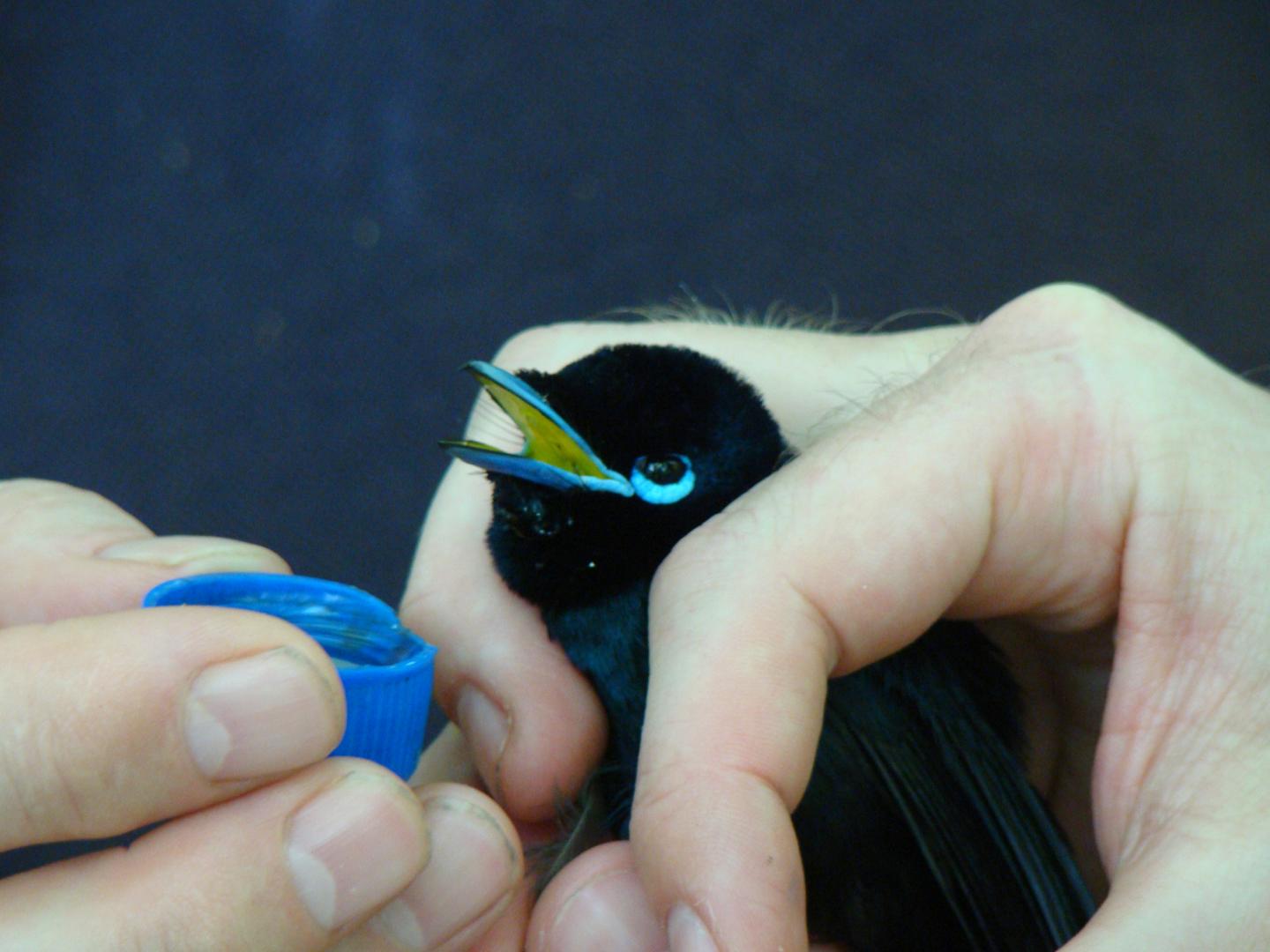A team led by a conservation biologist from the University of Kent has successfully relocated threatened Seychelles paradise flycatchers (Terpsiphone corvina) to a different island to help prevent their extinction

Credit: John Nevill
A team led by a conservation biologist from the University of Kent has successfully re-located threatened Seychelles paradise flycatchers (Terpsiphone corvina) to a different island to help prevent their extinction.
Four females and two males were caught on Denis Island and taken to Curieuse Island, where they joined 11 males and nine females who were moved there from La Digue Island at the end of last year. Four weeks after that release, the first birds had nested, with the first chick recently fledged.
The project was led by Jim Groombridge, Professor of Biodiversity Conservation and Head of Kent’s School of Anthropology and Conservation (SAC). Dr Rachel Bristol, who completed her PhD at the Durrell Institute of Conservation and Ecology (DICE) in SAC managed the project in partnership with the Seychelles National Parks Authority. The project was financed by the UK Government’s Darwin Initiative.
The move required the team to:
- catch the birds using mist nets
- delicately mark their tails so they are individually identifiable until their next moult
- take blood samples
- put them in transfer boxes (recycled cardboard boxes- modified to ensure air and with a branch placed inside for the birds to perch on)
- transfer them by plane to Praslin, then by boat trip to Curieuse
- give them rehydration and energy fluid
- before releasing them from the hand
The Seychelles paradise flycatcher is currently ‘Critically Endangered’ on the International Union for Conservation of Nature IUCN red list of endangered species and conservationists hope that successfully establishing this additional population on Curieuse Island could mean they are down-listed to a less endangered category.
The first ever conservation introduction of the Seychelles paradise flycatcher, from La Digue to Denis Island, was undertaken by the team in 2008. It was so successful that the population there has grown considerably from the 23 translocated individuals to the current estimate of over 85 birds. It is from this population that the conservation team were then able to source some of the birds for this second transfer to Curieuse Island, the rest coming from the relict population on La Digue Island.
Professor Groombridge said: ‘This is such a positive start for this new population. The translocation is a crucial milestone in the successful recovery of this critically endangered bird, and represents a highly successful long-term international collaboration between the Government of Seychelles, local conservation partners and DICE at the University of Kent, and will hopefully lead to a more secure future for this beautiful bird. Successes like this are part of what I teach to our Wildlife Conservation BSc students as these cases require a real understanding of how to bring species back from the brink of extinction.’
###
Kent’s Wildlife Conservation BSc aims to find innovations to address the multiple causes of animal and plant extinction whether through habitat loss, over-exploitation, pollution, disease, invasive species or global climate change.
Images by kind permission of Rachel Bristol:
https:/
For further information and interview or image requests contact Sandy Fleming at the University of Kent Press Office.
Tel: +44 (0)1227 823581
Email: [email protected]
News releases can also be found at http://www.
University of Kent on Twitter: http://twitter.
Established in 1965, the University of Kent – the UK’s European university – now has almost 20,000 students across campuses or study centres at Canterbury, Medway, Tonbridge, Brussels, Paris, Athens and Rome.
It was ranked 22nd in the Guardian University Guide 2018 and in June 2017 was awarded a gold rating, the highest, in the UK Government’s Teaching Excellence Framework (TEF).
In 2018 it was also ranked in the top 500 of Shanghai Ranking’s Academic Ranking of World Universities and 47th in the Times Higher Education’s (THE) new European Teaching Rankings.
Kent is ranked 17th in the UK for research intensity (REF 2014). It has world-leading research in all subjects and 97% of its research is deemed by the REF to be of international quality.
Along with the universities of East Anglia and Essex, Kent is a member of the Eastern Arc Research Consortium (http://www.
The University is worth £0.7 billion to the economy of the south east and supports more than 7,800 jobs in the region. Student off-campus spend contributes £293.3m and 2,532 full-time-equivalent jobs to those totals.
Kent has received two Queen’s Anniversary prizes for Higher and Further Education.
Media Contact
Sandy Fleming
[email protected]




